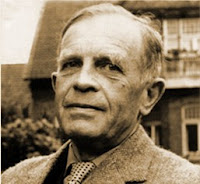The Third Way: Wilhelm Röpke’s Vision of Social Order, by Ralph E. Ancil
Wilhelm Röpke is well known in conservative circles for his work on the extra-economic foundations of the free market. But more broadly Röpke was concerned with the overall social malaise of the modern age, a concern triggered by his experience of the first World War and its aftermath in Germany. He became alarmed at the disintegration of important relationships, of those ways of life and institutions that are vital to the survival of Western civilization, if it is not to succumb to collectivism, socialism, and totalitarianism. He thought of the West as suffering from a marasmus of the body, a weakening due to self-consumption. In short, he believed that the West was squandering its spiritual inheritance.
The free market is only a part of this general concern but even here it is not mainly defended on economic or material grounds: “I would stand for a free economic order even if it implied material sacrifice and if socialism gave the certain prospect of material increase.”[1] What mattered first and foremost were “the eternal problems of an ordered society.”[2] In confronting those problems, he came to articulate his vision of social order.
To do this Röpke became synthesizer, weaving together various elements into a complex and prolific pattern of thought. In tracing the main features of that thought, I shall present both his “diagnosis” of the West’s illness, including some of his lesser known views, and his “therapy” for treating these ills. Finally, I will discuss and criticize some aspects of his synthetic vision.
Röpke levels several basic criticisms against modern society. First among its problems is the loss of hierarchical “structure.” The dissolution of naturally hierarchical order stems in large measure from a false conception of democracy. The health of the social body depends upon an order “where each individual has the good fortune of knowing his position” (SCOT, 10). But in modern society the individual has no such good fortune. The loss of the hierarchical order has produced a morally and socially atomized system, leaving the individual without a proper place, estranged from others and without true fellowship (SCOT, 10, 11).
The first part of the hierarchical structure that succumbs to the process of disintegration is the family. The situation has decayed to the point where the family “must needs wither and finally degenerate into a mere common address, with the reservation that the contract can be terminated by divorce at any time” (SCOT, 15). Divorced from the ties of family, neighborhood, nature and a properly structured society, the individual is vulnerable to Vermassung (enmassment) and “proletarisation.”[3]
Another force contributing to collectivism is what Röpke refers to as “Eternal Saint-Simonism” (CH, 61–63). Positivism and scientism are among the great diseases of the modern mind. His view is not unlike Hayek’s in The Counter-Revolution of Science. But he describes the problem this way:
This faith in Science . . . in its permanent and benevolent progress, in its promise for the future and its claim to absolute leadership, in a word, that positivist, technically-minded materialistic culture of the laboratories, of mathematical functions, of the microscope and of the mere, stupid facts, this gospel which, after the pattern of French phraseology we call “scientism” . . . . has today become a world religion to which Christian as well as Mohammedan, Buddhist and Atheist have devoted themselves with equal enthusiasm. (CH, 61)
It was in Paris that this new spirit first triumphed, producing positivism “with its familiar hubris and its dehumanizing effects”(CH, 62). From here the evil genii spread to Germany and became united with Hegelianism and other French tendencies to produce Cartesianism, Encyclopaedists, the Ecole Polytechnique, Prussianism, Relativism, Materialism, Marxism, Utilitarianism, Biologism, Evolutionism, and Pragmatism (CH, 62). These are the forces of evil and darkness which constitute Saint-Simonism and which intend to establish “the nightmare of a veritable Hell of civilization brought about by the complete instrumentation and functionalisation of humanity” (CH, 63).
Read the complete article in The Imaginative Conservative
